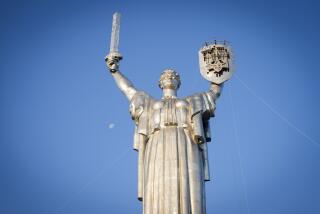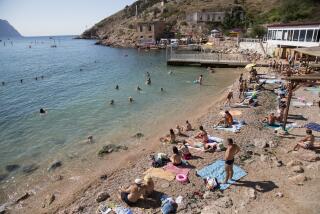In Ukraine, Fight Over Gods’ Little Acre
- Share via
BALAKLAVA, Ukraine — The fragment of prayer to the greatest of Roman gods was small: “Jupiter the great, most powerful and beautiful . . .”
But the carving on a stone tablet was a monumental discovery for Ukrainian archeologists last month when they excavated it at construction site in this small town on the tip of the Crimean peninsula.
When they uncovered sacrificial tables and altars to Hercules and Vulcan, the god of fire, it became clear that they had found the first ancient Roman temple north of the Black Sea. During a tour of the pagan pantheon emerging from the soil that had concealed it for nearly two millenniums, archeologist Oleh Savelya called the site “absolutely unique in this part of the world.”
So is the legal problem it is creating.
The archeologists want the site declared a historical preserve. “It will add to the area’s potential for attracting tourists,” Savelya argued.
But unlike vast swaths of post-Soviet Ukraine’s territory, the land is privately owned. The conflict between public and private interests could test the strength of property rights under Ukraine’s new constitution.
“I have no claims on the artifacts. They can take them all to a museum. But this land is mine,” said owner Oleh Taran, a 25-year-old Baptist deacon who is pouring a 2,000-square-foot foundation.
“We’ve known there was something big here since 1991, when we found the remains of a Roman administrative building over there,” Savelya said, waving at a parched field nearby. When Jupiter’s prayer was found, Savelya ordered construction suspended.
Under Ukraine’s Soviet-era laws, builders must allow “salvage” excavations before any permanent construction. Unique ruins--Roman pantheons, for example--can be declared national reserves, where building is banned.
Although Soviet constitutions provided a “right to housing,” they never allowed ownership of land. Declaring someone’s state-owned backyard an archeological reserve was simply an issue of allocation.
But under Ukraine’s new constitution enshrining private-property rights, it is an issue of expropriation. If the town government decides to take Taran’s land for reasons of public interest, the national charter says he must be compensated first.
The problem is, more digging is needed to decide if the pantheon is special enough to warrant taking the land. But a complete excavation will cost about $15,000, which the regional administration does not have.
While the archeologists are hoping that the central government in Kiev will scrape the money together, the land is in legal limbo.
But the archeologists have also been doing some other digging. On a table in their camp, dig leader Andrij Filippenko unrolls what he says is a copy of Taran’s blueprint.
The sketch shows a large complex of plazas and outdoor restrooms. The house planned for the spot where the altars to Hercules and Vulcan stand today appears as a large structure marked “prayer room.”
“This is no private house!” exclaimed Savelya. “It’s a Baptist church, and he needs a special permit to build one here.”
Taran denies the charge and the authenticity of the blueprint.
“According to all the official documents, this will be a private home,” said the young deacon. But he admits that Balaklava Baptists, who now rent space in a cultural center, will come to pray there, and he may even donate the house to them when it is built.
“It’s my property,” he declared. “I can do whatever I want with it.”
More to Read
Sign up for Essential California
The most important California stories and recommendations in your inbox every morning.
You may occasionally receive promotional content from the Los Angeles Times.










